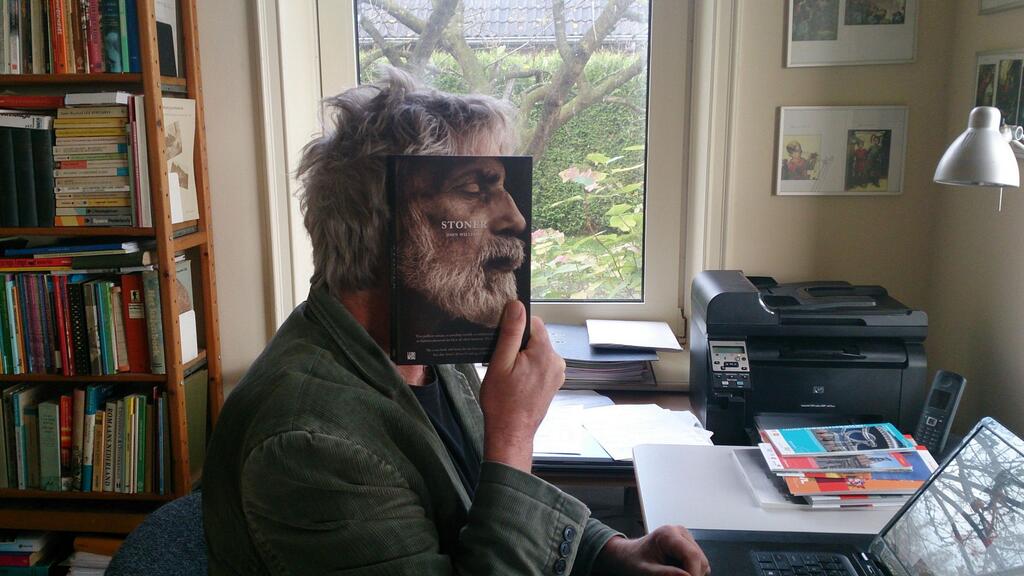
In sensible circles, 4Chan is dismissed for its racism, its porn of dubious legality, its gore- and furry-oriented content. But it does differ from board to board. If you avoid /b and /pol the experience is similar to Reddit, only less smug and repulsive. The /lit board is credible, and populated with snarky and adorable MFA-types. When they aren’t bitching about Tao Lin (who allegedly posts on the board) or decrying DFW as pleb-tier, the /lit community often provides valuable insights and recommendations.
Last summer a book called Stoner was referenced often. I began noticing Stoner in other places, and assumed it was a recent novel. Not the case. It was published in 1963 by National Book Award-winner John Williams. It’s gone through several revivals in the five decades since its publication, but this recent one gathered the most momentum. Ian McEwan and The New Yorker jumped on board, and it was named Waterstone’s Book of the Year in 2013.
Despite being a fiction writer, I read mostly non-fiction these days. When I do read fiction it skews towards either pulpy genre stuff or the maximalist/experimental end of the spectrum. Also, shamefully, I have a real concentration deficit when it comes to bygone periods. Great works transcend, of course, but a story about a Missouri professor circa 1910 to the 1940s didn’t promise to hold my increasingly-fickle attention. Stoner gave zero fucks about my preconceived ideas of what it would be. It was so rewarding and relatable, so potent and concise, that I read it in two sittings. As the final pages approached, I knew I wouldn’t be able to replace it soon.
Should I clumsily summarize? No? Okay. Here’s the synopsis from the jacket copy:
William Stoner is born at the end of the nineteenth century into a dirt-poor Missouri farming family. Sent to the state university to study agronomy, he instead falls in love with English literature and embraces a scholar’s life, so different from the hardscrabble existence he has known. And yet as the years pass, Stoner encounters a succession of disappointments: marriage into a “proper” family estranges him from his parents; his career is stymied; his wife and daughter turn coldly away from him; a transforming experience of new love ends under threat of scandal. Driven ever deeper within himself, Stoner rediscovers the stoic silence of his forebears and confronts an essential solitude.
John Williams’s luminous and deeply moving novel is a work of quiet perfection. William Stoner emerges from it not only as an archetypal American, but as an unlikely existential hero, standing, like a figure in a painting by Edward Hopper, in stark relief against an unforgiving world
Unlikely existential hero standing in stark relief against an unforgiving world, you say? Quiet perfection? I’ll take ten.
Without further ado, here are my favourite quotes from Stoner and a few annotations.
*
“Stoner’s colleagues, who held him in no particularly high esteem when he was alive, speak of him rarely now; to the older ones, his name is a reminder of the end that awaits them all, and to the younger ones it is merely a sound that evokes no sense of the past and no identity with which they can associate themselves or their careers.”
*
“Like many men who consider their success incomplete, he was extraordinarily vain and consumed with a sense of his own importance.”
This applies to about 100 middling artist types I know, myself included. It also applies to many people I know who have no particular aspiration outside of perhaps condo kitchen remodelling, but still consider themselves possessed of greatness, and, with no objective greatness on the horizon, bluster through life cursed by a cruel peripheral knowledge of their unimportance.
*
“He had a glimpse of a figure that flitted through cheap smoking room anecdotes, and through the pages of cheap fiction—a pitiable fellow going into his middle age, misunderstood by his wife, seeking to renew his youth, taking up with a girl years younger than himself, awkwardly and apishly reaching for the youth he could not have, a fatuous, garishly got-up clown at whom the world laughed out of discomfort, pity, and contempt.”
I’d say 40% of my fiction is about this subject. Never wrote a sentence like this though. Probably never will. Good thing there’s always suicide.
*
“In his extreme youth Stoner had thought of love as an absolute state of being to which, if one were lucky, one might find access; in his maturity he had decided it was the heaven of a false religion, toward which one ought to gaze with an amused disbelief, a gently familiar contempt, and an embarrassed nostalgia. Now in his middle age he began to know that it was neither a state of grace nor an illusion; he saw it as a human act of becoming, a condition that was invented and modified moment by moment and day by day, by the will and the intelligence and the heart.”
*
“The love of literature, of language, of the mystery of the mind and heart showing themselves in the minute, strange, and unexpected combinations of letters and words, in the blackest and coldest print—the love which he had hidden as if it were illicit and dangerous, he began to display, tentatively at first, and then boldly, and then proudly.”
If you were ever mocked for being bookish, or felt out of place for not embracing crass elements of the culture, please do use this quote to rhetorically violate any persecutors in your vicinity.
*
“He listened to his words fall as if from the mouth of another, and watched his father’s face, which received those words as a stone receives the repeated blows of a fist.”
*
“He had come to that moment in his age when there occurred to him, with increasing intensity, a question of such overwhelming simplicity that he had no means to face it. He found himself wondering if his life were worth the living; if it had ever been. It was a question, he suspected, that came to all men at one time or another; he wondered if it came to them with such impersonal force as it came to him. The question brought with it a sadness, but it was a general sadness which (he thought) had little to do with himself or with his particular fate; he was not even sure that the question sprang from the most immediate and obvious causes, from what his own life had become. It came, he believed, from the accretion of his years, from the density of accident and circumstance, and from what he had come to understand of them. He took a grim and ironic pleasure from the possibility that what little learning he had managed to acquire had led him to this knowledge: that in the long run all things, even the learning that let him know this, were futile and empty, and at last diminished into a nothingness they did not alter.”
Maybe this paragraph best explains the book’s renewed popularity, as that sounds like it could easily be a hipster/millennial manifesto. If it were shorter that would be the most popular tattoo of 2014.
Article by Mike Sauve. Follow him on Twitter @mpsauve









